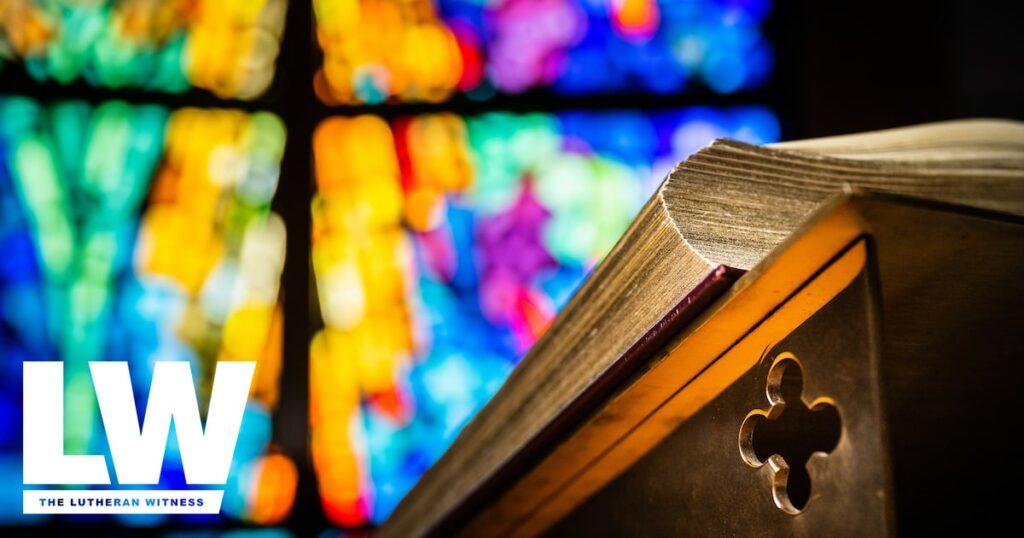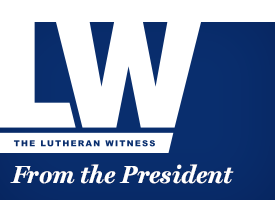
by Matthew C. Harrison
There is a fabulous Greek word, homologeo, which means to “say the same thing.” In the New Testament it is often translated as “confession” and encompasses three important aspects of the Christian faith:
- The confession of sins. “If we confess our sins, [God] is faithful and just to forgive us our sins and to cleanse us from all unrighteousness” (1 JOHN 1:9).
- The confession of the content of the faith. “Whoever confesses me before men, I will confess before my father in heaven” (MATT. 10:32). This means to confess Jesus to be the Son of God, Savior of the world.
- The confession of praise. “I confess [usually translated as “praise”] you Father …” (MATT. 11:25).
All three shades of meaning belong together.
If the strong confession of sin is missing, there is no real understanding of our urgent need for a Savior. Luther said that if a “mere man” were in the scale over against our sins, and not the Divine-human Son of God, we’d be lost. That’s a strong confession of who Jesus is. If we indeed confess our sins, but have no idea of the divine remedy for our sins in the doctrine of Christ — in justification (ROM. 3–4), reconciliation (1 COR. 5:19), Holy Baptism (1 PETER 3:21), Holy Absolution (JOHN 20:21–23), the Lord’s Supper (1 COR. 11:23–26), etc. — then we’d be in bad shape, prone to look for human remedies for sin. And oh, what wretches we are, indeed, if the recognition of our sin, of who Christ is for us, and of all He’s done for us don’t cause us to well up in praise and thanksgiving and yes, joy! (PHIL. 4:4).
From the beginning, Christ called forth a confession. “You, who do you say that I am?” Jesus asked his disciples (MATT. 16:15). From the beginning, there were departures from God’s Word that required a confession of the true faith.
The “ecumenical creeds” — the Apostles’, Nicene and Athanasian creeds (and Luther at one point throws in the Te Deum for good measure as a confession as praise!) — were the Church’s response to any rejection of the Bible’s teaching.
At the time of the Lutheran Reformation, a clear confession was required again. Our Lutheran Book of Concord is that confession. Salvation, according to the Bible, is a free act of divine grace. Salvation was achieved by Christ’s cross and resurrection and is delivered by the Word of the Gospel and by the sacraments. Faith alone lays hold of the gift. Christ alone is the way to salvation. The Bible alone is the source of all divine truth.
As Lutherans, we assert that it does not suffice to say simply “my confession is the Bible.” There’s hardly a religion in the sphere of Christianity, or even the most esoteric and non-Christian religion (e.g., the Jehovah’s Witnesses who deny the divinity of Christ, the Trinity, etc.) who don’t claim to confess the Bible. They all claim to use the Bible! But we as Lutherans confess the Bible as it is rightly understood — that is, the Bible as its own interpreter. We use reason, logic and grammar as servants, not masters of the biblical text. The Lutheran Confessions rightly set forth the teaching of the Scriptures. The Bible is God’s Word and is normative for us. The Lutheran Confessions (known most popularly in Luther’s catechisms) are a secondary authority which derive their authority from the Scriptures. By requiring public allegiance to the Book of Concord, all our congregations, all our church workers and all our institutions together confess, “Yes, this Book of Concord is a true confession of the teachings of the Bible. Because this is so, these confessions are normative for us.”
Church historian Hermann Sasse loved to point out that those who de-emphasized or ignored our public confession in the Book of Concord soon gave up the authority of the Bible, too! The Lutheran Confessions are a great benefit in many ways. They focus us on the Gospel of Jesus. They teach us that the messages of the Law and the Gospel are always relevant. They free us from human attempts to obtain divine merit by directing us to Christ alone. They clearly condemn false teachings that have arisen in the Church. They instruct us that the Lutheran Church is the catholic church gone right. They teach us that there is salvation also outside the orthodox Lutheran Church, for there is salvation wherever Christ is known and believed. The Book of Concord teaches that Lutherans are conservative, and that we retain worship and ceremonies so long as they don’t contradict the Gospel. They also teach that there is great freedom in matters of worship, but that such matters should be in the service of the Gospel, with great care to avoid offense. The Lutheran Confessions teach that Christ came for all people, and that the Lutheran Church as the Church of pure Gospel of grace in Christ is therefore a church about mission until Jesus returns.
I like to think of the Book of Concord as a beautiful pasture with hills and valleys and streams. It provides an untold number of places to graze for teaching, edification, consolation, comfort, surety, direction for living in Christ and more. But the pasture has a fence. Within the pasture, I may graze freely. I may freely think and come to fresh understandings of the biblical texts and teaching of the Church. But I may not step outside the fence, lest I fall into false teaching which threatens the Gospel. And that strong fence is also a protection for the grazing sheep. No congregation, no institution, no church worker, and especially no pastor, should presume to live and work within the confines of the pasture, if they knowingly reject the biblical teachings of our Lutheran Confessions.
In recent years, CPH has sold well over 100,000 copies of Concordia: The Lutheran Confessions — A Readers Edition of the Book of Concord.
Get a copy if you don’t have one already! You’ll find a wealth of helpful material in addition to the various confessions of the Lutheran Church. And you’ll find that your comprehension of the depth of our need and the greatness of Christ and His gifts will deepen and broaden and embolden your joyous praise of God, Father, Son and Holy Spirit.
— Pastor Harrison
The Rev. Dr. Matthew C. Harrison is president of The Lutheran Church—Missouri Synod





A pastor who vows to “make these confessions my own” would thereby seem to be standing by every word, line of reasoning, and attitude conveyed by those confessions. Yet prominent Lutheran writers have described confessional subscription as signifying adherence to the “doctrinal content” of the Confessions, such content being a subset of all that the Confessions say. Is there an annotated copy of the Book of Concord that clearly distinguishes the words that convey “doctrinal content” from the words that do not?
As a young teenager, in the Rite of Confirmation I declared my agreement with the Small Catechism only. As a lay member of an LCMS congregation, am I somehow further obligated to agree with all the doctrinal points made outside the Small Catechism in the Book of Concord?
Are women allowed to preach and be like a priest? and are gay persons allowed to be a priest? in the Lutheran Church.
Thank you for your comment. Answers to your questions may be found on our Frequently Asked Questions pages at http://www.lcms.org/about/beliefs/faqs under the Worship/Congregational Life section and the Family, Marriage and Human Sexuality section.